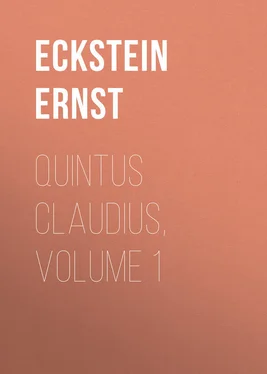Ernst Eckstein - Quintus Claudius, Volume 1
Здесь есть возможность читать онлайн «Ernst Eckstein - Quintus Claudius, Volume 1» — ознакомительный отрывок электронной книги совершенно бесплатно, а после прочтения отрывка купить полную версию. В некоторых случаях можно слушать аудио, скачать через торрент в формате fb2 и присутствует краткое содержание. Жанр: foreign_antique, foreign_prose, на английском языке. Описание произведения, (предисловие) а так же отзывы посетителей доступны на портале библиотеки ЛибКат.
- Название:Quintus Claudius, Volume 1
- Автор:
- Жанр:
- Год:неизвестен
- ISBN:нет данных
- Рейтинг книги:4 / 5. Голосов: 1
-
Избранное:Добавить в избранное
- Отзывы:
-
Ваша оценка:
- 80
- 1
- 2
- 3
- 4
- 5
Quintus Claudius, Volume 1: краткое содержание, описание и аннотация
Предлагаем к чтению аннотацию, описание, краткое содержание или предисловие (зависит от того, что написал сам автор книги «Quintus Claudius, Volume 1»). Если вы не нашли необходимую информацию о книге — напишите в комментариях, мы постараемся отыскать её.
Quintus Claudius, Volume 1 — читать онлайн ознакомительный отрывок
Ниже представлен текст книги, разбитый по страницам. Система сохранения места последней прочитанной страницы, позволяет с удобством читать онлайн бесплатно книгу «Quintus Claudius, Volume 1», без необходимости каждый раз заново искать на чём Вы остановились. Поставьте закладку, и сможете в любой момент перейти на страницу, на которой закончили чтение.
Интервал:
Закладка:
Suddenly the head oarsman’s time-marking hammer ceased; the bright spot of light cast by the sun through the glass skylight on to the panelled wall, described a brief orbit and then vanished; the vessel had swung round and was at anchor.
“Madam,” said Aurelius to Octavia, “allow me to offer you my services. We Northmen rarely use litters, 48 48 Litters ( lectica ). The usual conveyance, somewhat resembling the Oriental palanquin, were supplied with rich curtains ( vela ) and in other respects became the object of luxurious decorations. The number of litter-bearers ( lecticarii , calones ) varied from two to eight. In the city of Rome itself, where riding in carriages was not allowed during the day-time, the lecticae took the place of our carriages and hacks, for they could also be hired by the hour, and there were stands of them ( castra lecticariorum ) in several frequented quarters.
still – on the principle that a wise man should be ready for all emergencies – Herodianus has provided my galley with that convenience.”
“And the litters are already awaiting your commands on deck,” added the freedman.
“You have surpassed yourself, Herodianus! Well, then, whenever it is your pleasure…”
“Then it is settled,” said Octavia, going to the door. “For a few days you will be my guest.”
“For as long as you will allow,” Aurelius would have said; but he thought better of it and only bowed in answer.
CHAPTER II
The squall had completely died away; the waves were still tossing and tumbling in the bay, but the streamers of the crowd of barks, which lay under the shore, hardly fluttered in the breeze, and the fishing-boats were putting out to sea in little fleets.
Gay and busy was the scene on the quays of Baiae; distinguished visitors from every part of the vast empire were driving, riding or walking on the lava-paved 49 49 Lava Blocks. The usual material for pavements in central and southern Italy.
sea-wall, and the long roads round the harbor. Elegantly-dressed ladies in magnificent litters were borne by Sicambri 50 50 Sicambri. A powerful German tribe, occupying in the time of Caesar the eastern bank of the Rhine, and extending from the Sieg to the Lippe.
in red livery, 51 51 Red Livery. The usual costume of the litter-bearers in the time of the emperors.
or by woolly-headed Ethiopians. 52 52 Woolly-headed Ethiopians. The name Ethiopian Αἰθίοπες in its more restricted sense, applies to the inhabitants of Upper Egypt; in a more general meaning to the whole population of North-eastern Africa, and South-western Asia. According to Herodotus (VII, 70) the Ethiopians dwelling in the East had smooth, those in the West woolly hair.
Lower down a crowd of sailors shouted and struggled, and weather-beaten porters in Phrygian caps urgently offered their services, while vendors of cakes and fruit shrilly advertised the quality of their fragrant goods. Behind this bustling foreground of unresting and eager activity rose the amphitheatre of buildings that composed the town. Aurelius had been charmed with Panormus and Gades, but he now had to confess that they both must yield the palm in comparison with this, the finest pleasure-resort and bathing-place in the world. Palace was ranged above palace, villa beyond villa, temple above temple. Amid an ocean of greenery stood statues, halls, theatres and baths; 53 53 Baths ( thermae , θέρμαι, that is “warm baths”) were public bathing-establishments on the grandest scale, modelled after the Greek wrestling-schools. See Becker, Gallus III, p. 68 and following.
as far round as the promontory of Misenum the shores of the bay were one long town of villas, gorgeous with the combined splendors of wealth, and of natural beauty.
The two ladies and their cortège proceeded for some distance along the shore of the harbor, and then turned up-hill in the direction of Cumae. 54 54 Cumae (Κύμη) now Cuma, the oldest of the Greek colonies in Italy, beyond the mountain range that bounds the bay of Baja on the west; it is only a few thousand paces from Baja.
In front walked eight or ten slaves 55 55 In front walked eight or ten slaves. Such a vanguard was customary among people of distinction, even when they went on foot.
who cleared the way; then came Octavia, her litter borne by six bronze-hued Lusitanians. 56 56 Lusitanians. A people living in the region now known as Portugal, between the Tagus ( Tajo , Tejo ) and Durius, ( Duero , Douro .)
Claudia shared her litter with Baucis, while Herodianus, Magus, Octavia’s rowers, and a few servants with various bundles followed on foot. Aurelius had mounted his Hispanian horse and rode by the side of the little caravan, sometimes in front, sometimes behind, and enquiring the way, now of Octavia and now of Claudia and Baucis.
“Our villa is quite at the top of the ridge,” said Claudia. “There, where the holm oaks come down to the fig gardens.”
“What?” cried Aurelius in surprise. “That great pillared building, half buried in the woods to the left?”
“No, no,” said the girl laughing; “the gods have not housed us so magnificently. To the right – that little villa in the knoll.”
“Ah!” cried the Batavian; the disappointment was evidently a very pleasant one. “And whose is that vast palace?”
“It belongs to Domitia, Caesar’s wife. Since she has lived separate from her imperial lord, she always spends the summer here.”
The road grew steeper as they mounted.
“Oh merciful power!” sighed the worthy Baucis, “to think that these fine young men should be made to toil thus for an old woman! By Osiris! I am ashamed of myself. To carry you, sweet Claudia, is indeed a pleasure – but me, wrinkled old Baucis! If I had not sprained my ribs – as sure as I live…! But I will reward them for it; each man shall have a little jar of Nile-water.”
“Do not be uneasy on their account,” said Herodianus, wiping his brow. “Our Northmen are used to heavier burdens!” Then, turning to Magus, he went on: “By all the gods, I entreat you – a draught of Caecubum! 57 57 Caecubum. A district on the shores of the bay of Gaeta, famous for its wine. See (Horace Od. I, 20, 9 and I, 37, 5) where it is said, that it would be positively sinful to bring Caecubian wine from the cellar with other kinds on ordinary occasions ( antehac nefas depromere Caecubum cellis avitis , etc. ).
I am bound to carry this weary load,” and he slapped his round paunch, “this Erymanthian boar, 58 58 Erymanthian boar. So called from Mt. Erymanthus in Arcadia, where the animal lived until slain by Hercules.
like a second Hercules, to the top of the hill on my own unaided legs! and I am dropping with exhaustion.”
The Goth smiled and signed to one of the slaves, who was carrying wine and other refreshments.
“The wine of Caecubus,” said Herodianus, “is especially good against fatigue. Dionysus, 59 59 Dionysus. A surname of Bacchus.
gracious giver, I sacrifice to thee!” and as he spoke he shed a few drops as a libation 60 60 Libation. Wine poured as an offering to the gods.
on the earth and then emptied the cup with the promptitude of a practised drinker.
In about twenty minutes more they reached Octavia’s house; in the vestibule 61 61 Vestibulum. The space in front of the house-door ( fores ) which in the time of the imperial government was frequently covered with a portico.
a young girl came running out to meet them.
“Mother, dear, sweet mother!” she cried excitedly, “and Claudia, my darling! Here you are at last. Oh! we have been so dreadfully frightened, Quintus and I; that awful storm! the whole bay was churned up, as white as milk. But oh! I am glad to have you safe again! Quintus! Quintus!..”
Читать дальшеИнтервал:
Закладка:
Похожие книги на «Quintus Claudius, Volume 1»
Представляем Вашему вниманию похожие книги на «Quintus Claudius, Volume 1» списком для выбора. Мы отобрали схожую по названию и смыслу литературу в надежде предоставить читателям больше вариантов отыскать новые, интересные, ещё непрочитанные произведения.
Обсуждение, отзывы о книге «Quintus Claudius, Volume 1» и просто собственные мнения читателей. Оставьте ваши комментарии, напишите, что Вы думаете о произведении, его смысле или главных героях. Укажите что конкретно понравилось, а что нет, и почему Вы так считаете.












